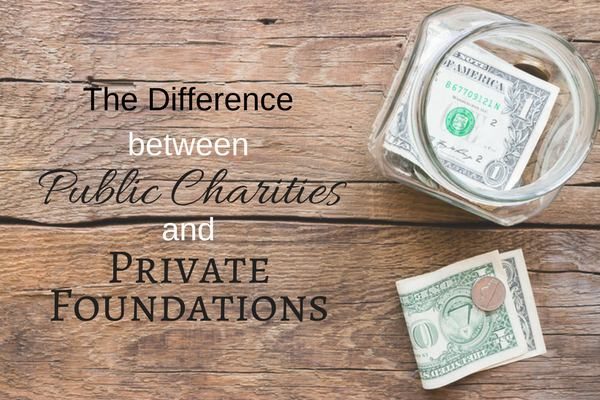Are you thinking of starting a nonprofit? Before you do, consider the Internal Revenue Service code, 501(c)(3), which governs nonprofit status. Nonprofits may be classified as either a public charity or a private foundation.
The Differences between Public Charity and Private Foundation
Public charities are organizations that perform charitable work, whereas, private foundations tend to be organizations that support public charities. While public charities and private foundations share a symbiotic relationship, they are also very different types of organizations.
Public Charities
Public charities mostly obtain their funding and support from the general public, through grants issued by individuals, government, and through private foundations. New 501(c)(3) organizations prefer public charity status as they receive specific tax advantages. Some of these benefits are:
- larger donor tax-deductible limits,
- support from private foundations, and
- assistance from other public charities.
A public charity is an organization that carries out some form of direct, charitable activity. These charities typically include:
- private schools,
- churches,
- homeless shelters, and others.
When applying for a public charity status, the IRS needs to understand how the public charity benefits the public’s best interest. If the IRS does not feel your reasons are a great enough benefit, then by default, your organization will become a private foundation.
Private Foundations
A private foundation is a nongovernmental, nonprofit organization managed by its own trustees or directors who manage a principal fund. Private foundations typically aid public charities and issue grants to those public charities that qualify.
There are reasons organizations choose the private foundation status over that of the public charity. One reason is that a private foundation does not have the IRS rule of more than 50% of the board not being related to each other. Another reason is that private foundations may be controlled by related parties and be funded by a small group, family, or individual. While a private foundation is also a tax exempt organization, most are subject to a 2% excise tax.
Public Charities and Private Foundations in California
The Office of the Attorney General regulates charities and those who solicit on their behalf. This protects charitable assets and ensure that donations are not misused. The Office of the Attorney General provides a variety of resources for public charities and private foundations and their donors.
Our nonprofit audit services give our clients valuable feedback and guidance which helps them decide how to best utilize their financial resources in the future. If you have any questions about our nonprofit services, one of our CPAs would be happy to speak with you at (925) 933-2626 or, email us at info@winttercpa.com.
